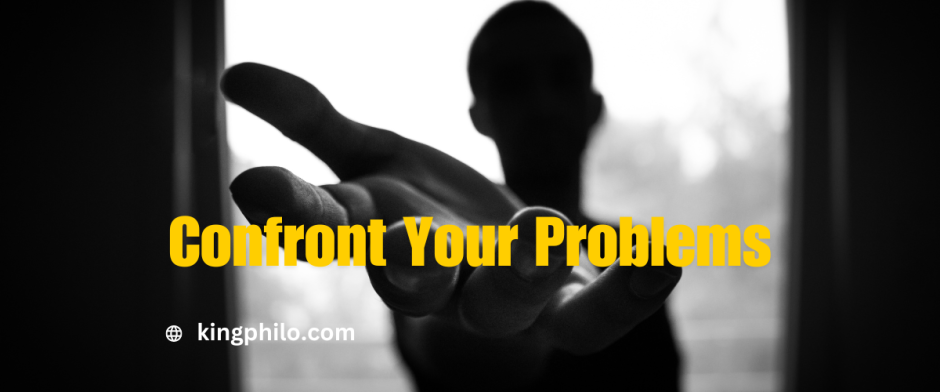There is an undeniable reality we all face as human beings: problems are inevitable. They pop up in different shapes and sizes, causing stress, discomfort, and, sometimes, profound distress. But as intimidating as they are, problems also offer opportunities for growth and development. Today, let’s talk about why it’s essential to confront your problems today, how to do it, and what this process can teach us.
The Necessity of Confrontation
Often, our instinctive response to a problem is to avoid it, hoping it will disappear on its own or become someone else’s concern. We procrastinate, distract ourselves, or just freeze. These avoidance strategies might bring momentary relief, but they do nothing to address the underlying issue. Moreover, ignored problems tend to grow, multiplying their potential to harm our lives.
Confronting your problems today means facing them head-on, understanding their origins, and taking actionable steps to solve them. This immediate confrontation will save you from a snowballing of worries tomorrow.
The Power of ‘Now’
‘Now’ is a powerful concept. It’s the only moment in which we can act. Yesterday is gone, and tomorrow isn’t guaranteed. . Today – right now – is the perfect time to take control of what we can change.
Problems confronted today can be lessons learned for tomorrow. Every tackled issue, big or small, strengthens our problem-solving muscles, builds resilience, and equips us with a newfound wisdom to tackle future challenges.
How to Confront Your Problems
Now that we understand why it’s crucial to confront problems today, let’s look at how to do this.
Acknowledge the Problem
The first step to confront a problem is to acknowledge it. Accept that there is a problem, that it’s causing distress, and it needs your attention. Don’t sugarcoat it, belittle it, or magnify it – see it for what it is.
- Understand the Problem
Dedicate time to understand the issue. This step might involve some self-reflection or discussion with others. Understand its root cause, what it’s impacting, and why it has become a problem. A well-understood problem is halfway solved.
- Develop a Plan
Once you understand your problem, it’s time to devise a solution. You may need to research, brainstorm, or seek help from Keep in mind, it’s alright to request help. well-developed plan will offer a clear roadmap to resolving the problem.
- Take Action
Don’t let your plan remain on paper – put it into action. Start with small, manageable steps and gradually work your way to the finish line.
- Reflect and Learn
After you’ve resolved the issue, reflect on the process. What worked? What didn’t? What could you do differently next time? Take these learnings forward to your next challenge.
The Hidden Gems in Confronting Problems
As you become more accustomed to confronting your problems, you’ll start to see the hidden benefits that come with it. You’ll gain resilience, confidence, and a sense of control over your life. You’ll learn more about yourself – your strengths, your weaknesses, and how you respond to challenges.
Remember, problems are not a reflection of failure but an opportunity for growth. So, don’t wait for tomorrow or the “right moment.” Confront your problems today, embrace the growth they bring, and step into a stronger, more resilient version of yourself. You have what it takes to face your challenges head-on, and there’s no better time to start than now.
Creating a Conducive Environment for Problem-Solving
While understanding and developing problem-solving skills is critical, creating an environment that supports this process can significantly ease the journey.
- Cultivate a Growth Mindset
A growth mindset, coined by psychologist Carol Dweck, is the belief that abilities can be developed through dedication and hard work. It’s the understanding that your potential is not fixed. When confronted with problems, a growth mindset allows you to see them as opportunities for learning and development, rather than obstacles blocking your path.
- Practice Mindfulness
Mindfulness helps us remain present and engaged during the problem-solving process. It keeps us from becoming overwhelmed by what might happen in the future or by what has happened in the past. A mindful approach helps us better understand the problem and makes room for creative solutions.
- Foster Capacity to appreciate people at their core
High emotional intelligence allows you to better manage your emotions during stressful times, improving your problem-solving abilities. It also enhances your capacity to work with others when resolving issues, promoting more collaborative and effective solutions. - Prioritize Self-care
Confronting problems can be emotionally taxing. It’s essential to take care of your physical and mental health during this process. Prioritize activities that help you relax and rejuvenate, ensuring you have the energy and mindset to tackle problems efficiently.
In Conclusion
Problems can be daunting, and confronting them can initially feel uncomfortable. However, the power to overcome these issues lies within us. The first step is to acknowledge the problem, then understand it, plan for it, act on it, and finally, learn from it.
Confronting your problems today does not merely mean addressing immediate challenges; it’s an investment in your personal growth and future resilience. It’s a journey that teaches you more about yourself and what you’re capable of achieving.
In the words of Albert Einstein, “The significant problems we face cannot be solved at the same level of thinking we were at when we created them.” By leveling up our thinking, cultivating a conducive environment, and developing problem-solving skills, we become better equipped to face the challenges that lie ahead.
So, don’t shy away from your problems. Confront them today, turn them into opportunities for growth, and witness the extraordinary transformation that awaits on the other side. The time is now; the power is yours. Face your problems today and step into a brighter, stronger tomorrow.



